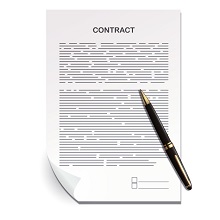Expertise in Legal Translation: A Field Demanding High-quality Work
April 18, 2016

As business becomes increasingly global, there are more frequent interactions with overseas countries and enterprises, which results in a growing demand for translations of legal documents such as contracts and application forms.
Translations of legal documents with important contents or for important purposes must be of the highest quality. In addition to being accurate, such translations must serve as legally valid documents in the country they are intended for.
Here is a brief description of expertise in legal translation, a field demanding more than linguistic skills.
Rising Demand for Legal Translations
Overseas business development or expansion inevitably requires legal documents such as contracts. Take contracts for instance: different types of contract documents - including agency/distributorship agreements, license agreements, intellectual property agreements, and lease agreements - can be needed, depending on business requirements. Besides contract documents, articles of incorporation, minutes of shareholder meetings, company rules and such also have to be translated. Moreover, additional legal translations will be required from time to time at various junctures in the course of overseas business development.
To facilitate business development overseas, it is important to respond promptly to those needs for legal translations.
Knowledge and Experience Count in Legal Translation
Normally, professional translators have certain fields of specialization where they have a competitive advantage, such as law, healthcare, machinery, and content. Every field of specialization has key requirements and characteristics. The variety of expressions allowed for translation of contracts and other legal documents is limited compared with other fields of translation. This is because any law is written using strictly defined terms to ensure that everybody who reads it interprets it in the same way.
Knowledge of consistently used expressions is essential for legal translation. Take the English word "agreement" for instance. There are quite a few Japanese equivalents for the word, including "dōi," "gōi," "keiyaku," "keiyakusho," "sashiiresho," and "shōdaku." It is necessary to choose the most appropriate equivalent on a case-by-case basis. Correctly understanding the source text and translating it into the target language based on specified definitions is a task that can only be performed by translators who have both knowledge and experience in the field of law.
"Format" Also Requires Attention in Legal Translation
In addition to the terms and expressions unique to legal documents, "format" also requires much attention. Even an accurate legal translation may not be recognized as legally valid in the country it is intended for, if its final format is different from the country's usual standards.
For example, Japanese contracts, whether executed by individuals or organizations, must bear the seals of the individuals or organizations. It may be no exaggeration to say that contracts without authentic seal impressions are invalid or void in Japan. This seal requirement, however, is a practice unique to Japan. In other countries handwritten signatures have the same legal effect as seals have in Japan. Overseas countries have different practices than those of Japan. Ensuring translations of legal documents serve as valid documents overseas requires paying careful attention to their format as well.
Legal Translation Requires Precise Expertise
Legal translation requires a high level of skill and experience, among other things. A mistranslation or an ambiguous translation may cause trouble later which could eventually lead to business failure. Legal translation is where seasoned translators, well-armed with knowledge and experience, must come in.
Related Services
| << Tourists Confused? "Funny English" All Over Japan | The Key to Global Business: Arabic, the Third Most Widely Used Language in the World >> |
To Contact Us Regarding Our Translation Services
For urgent needs, call:
+81-3-5730-6133
